Welcome to Breaking the Blueprint — a new blog series that dives into the unique business challenges and opportunities of Black business owners and entrepreneurs. Learn how they’ve grown or scaled their businesses, explored entrepreneurial ventures within their companies, or created side hustles, and how their stories can inspire and inform your own success.
Since the early 2000s, social media has impacted every aspect of people’s lives, including business. Entrepreneurs from all over the world have and continue to use social media as a tool to launch their brand, connect with people, and garner new customers.
Social media quickly replaced flyers as a form of marketing, and now business owners are investing their time into marketing strategies to reach 4.2 billion social media users worldwide.
Additionally, a Forbes article stated that 84% of respondents who completed a CMO Survey report using social media for brand building. One might even argue that social media is just as critical as a company’s website.
Social media has served as a staple in the Black community to connect in creative and hilarious ways through pictures, videos, words, and more. In fact, we’re so connected that it can take only a few minutes for people, services, or products to go viral on major social media platforms like Instagram, Facebook, Twitter, TikTok, YouTube, or Snapchat.
These sites have also helped Black-owned businesses gain visibility and engage with users in free, innovative ways.
I spoke with three social media experts who shared a list of strategies, resources, and success stories Black business owners can use to increase their following and expand their audiences. Let’s dive in.
6 Social Media Strategies for Black Business Owners
1. Build a community by creating engaging content.
Social media manager coach and content strategist Bolaji Ajibare believes creating engaging content is one of the main strategies Black-owned businesses should leverage.
Ajibare, who is popularly called TheSocialMediaOga, says that business owners should create material that allows them to interact with their followers. Entrepreneurs can grow their community by asking their audience what kind of information they’d like to see on their page to serve them properly.
Ajibare says it’s a good idea for users to incorporate various information to appeal to followers — including promotional, inspirational, and educational content, to display balanced material on their page.
Content and design strategist Alicia Noelle further emphasizes that business owners should post creative content that influences people to interact with them. Creating polls and responding to followers in the comments section are a couple of ways that business owners can communicate with their followers. Noelle says these efforts are the critical difference from simply gaining followers.
“I think that that’s what small businesses are going to have to realize as they change their marketing tactics in 2021, and beyond — that people are no longer going to buy from you because it looks pretty,” Noelle said. “They want to feel like they belong in your community, and you have to create that atmosphere for them.”
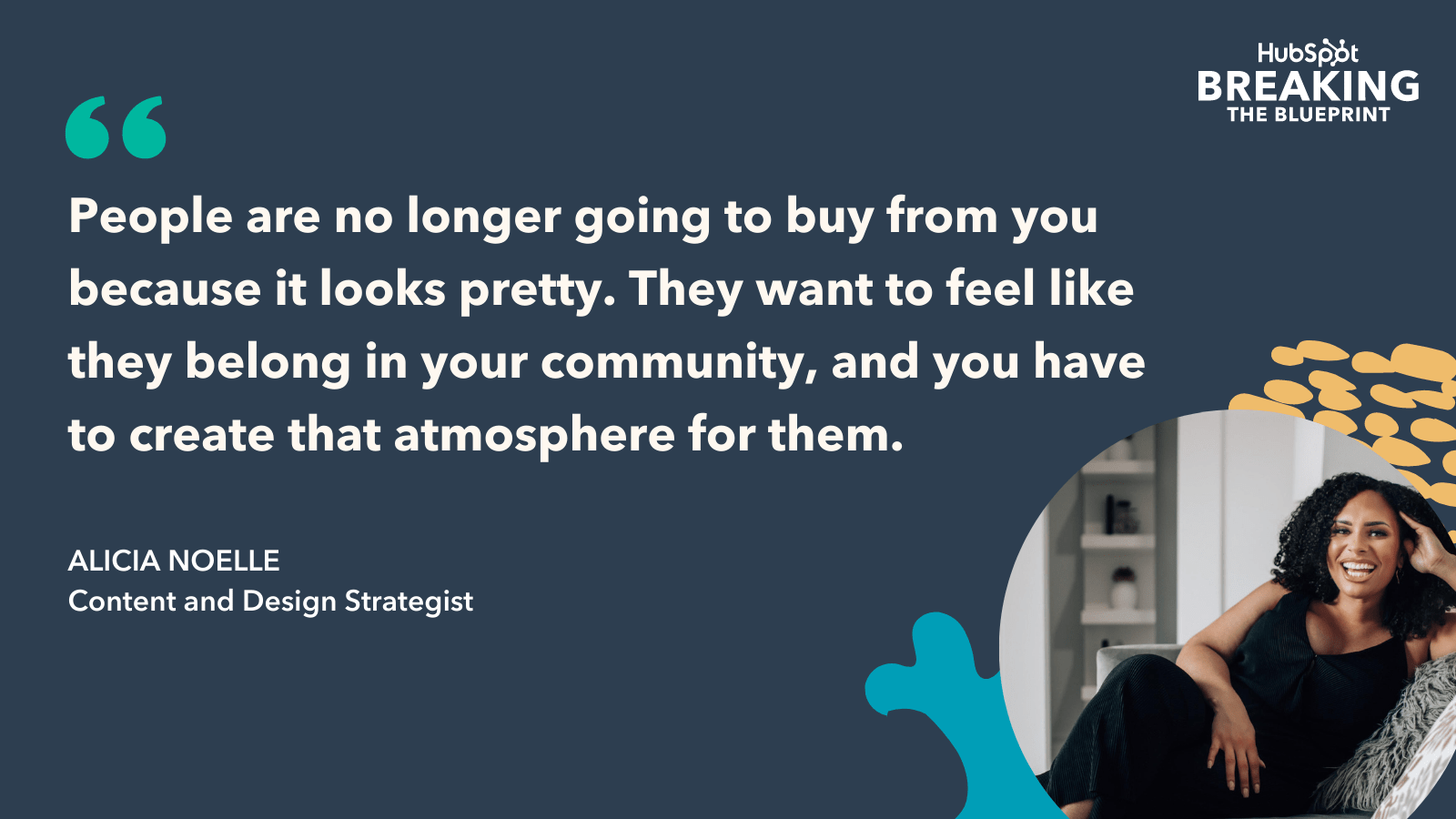
Social media expert and CEO of Thames Media Solutions, Michelle Thames, shared similar sentiments. Thames states that people forget that humans are on the other side of social media, and they still want to feel like they’re a part of a community.
“You have to nurture your audience by giving them tools and the resources,” she said.
Thames adds, “Whether you have a product-based business or a service-based business, you have to solve [your audience’s] problem and let them know why they need to come to you.”
Noelle and Thames mentioned natural hair care line Mielle Organics as an example of a Black-owned business that has successfully curated a community around their social media pages.
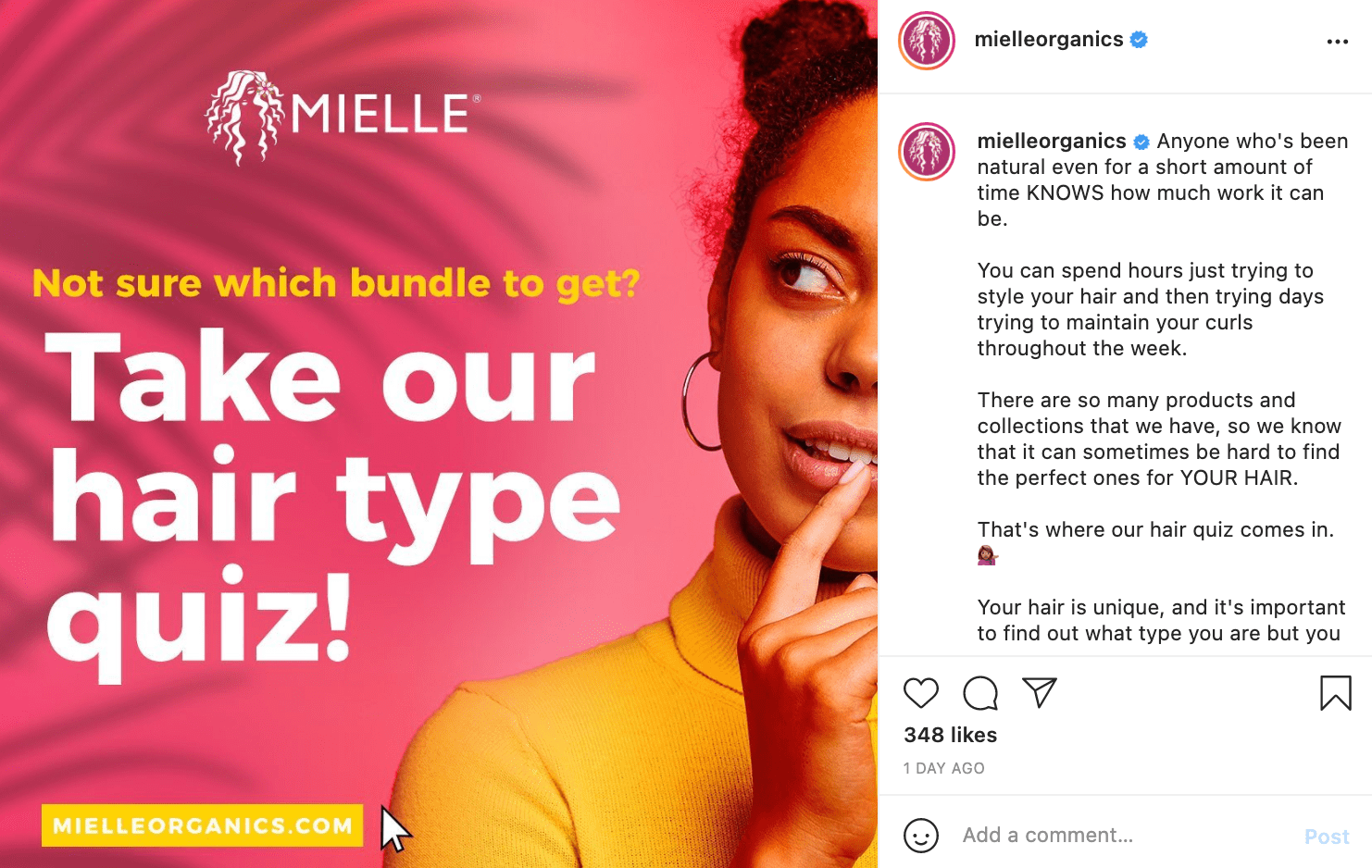 Image Source
Image Source
Social media influencers promote their line, and the company also offers promotions and giveaways. Mielle Organics features customers who use their products on their social pages, as well.
2. Write captions that resonate with your followers.
Noelle recommends that business owners develop prompts for their captions to complement their graphics or videos before they post.
According to the content and design strategist, every caption needs to tell a story that resonates or connects with a business’s audience. The text should be more than two sentences and should also include a call-to-action encouraging followers to subscribe to the company’s email list, sign up for discounts, or buy an item.
Noelle used Breanna Aponte as an example of an entrepreneur who writes good captions. She says that Aponte tells stories with her posts that resonate with her followers. Even though her posts may be unrelated to her business, she can still sell her social media services because of her authenticity.
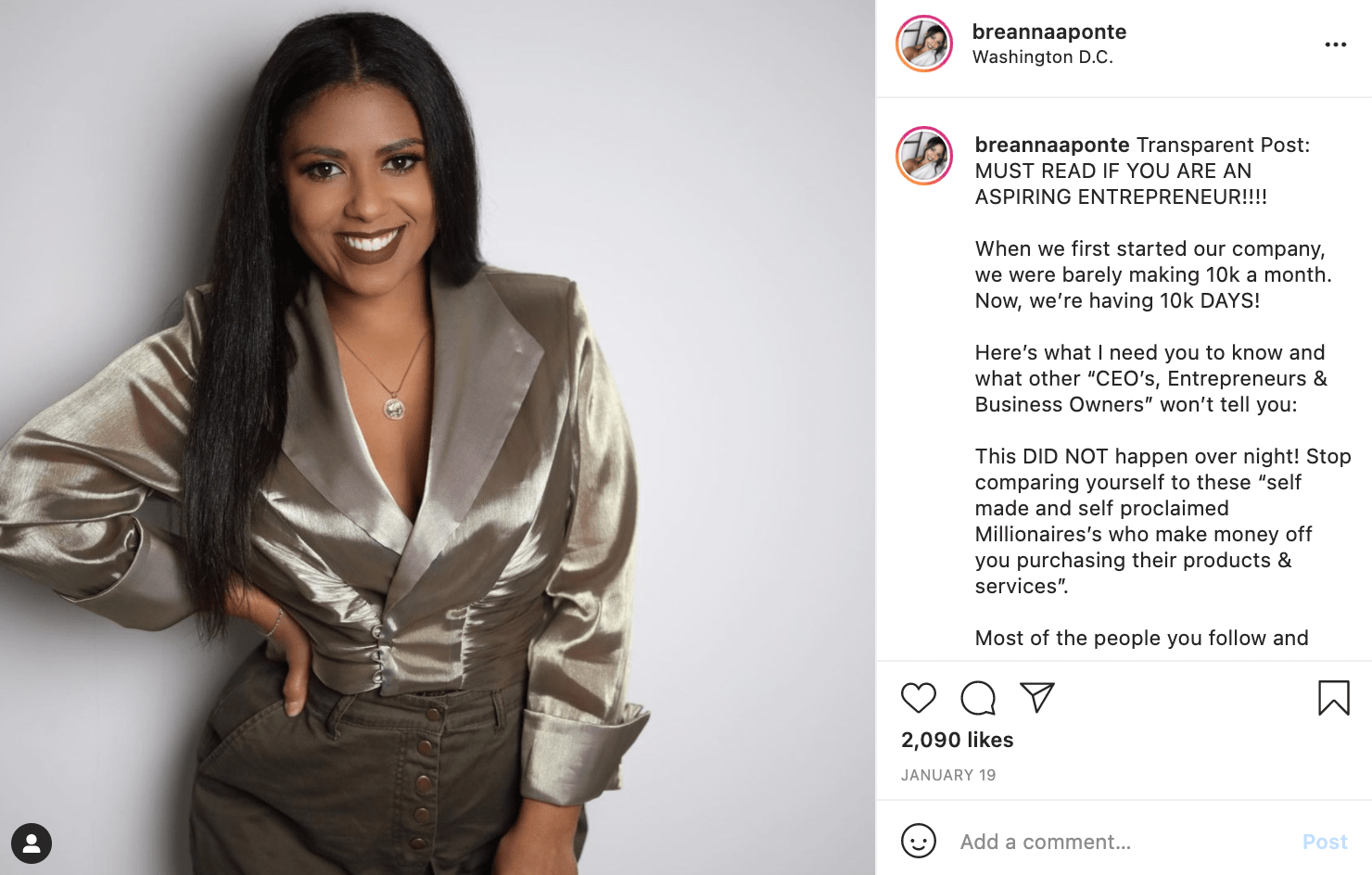 Image Source
Image Source
Noelle suggests that business owners create captions that put followers in a different mindset and influence them to want to read what they have to say.
Business owners can share a behind-the-scenes look of their brand on their IG Stories, Twitter Fleets, or Facebook Stories.
Mattie James is an example of an entrepreneur who uses her Stories feature effectively as an influencer. James posts consistent content highlighting her family, daily routine, links to brand promotions, and more.
The Stories feature for all platforms is also a great way for entrepreneurs to promote what they have to offer and communicate with followers who respond to their posts via DM.
Thames recommends that businesses should spend 30 minutes to an hour each day engaging with customers and followers to prove that they’re a trusted, reliable source. This effort also makes followers feel like business owners care.
3. Create videos and reels.
Using videos and Instagram Reels is critical for businesses to maintain engagement and attract new followers.
“If you’re looking to do videos, Reels are going to help you get in front of more people because Instagram prioritizes their new features. Reels is a new feature, and they want to make sure that users use it,” Thames said.
Thames revealed she gained roughly 1,200 followers in 30 days using Instagram Reels, and she doesn’t even post every day. She emphasized that business owners’ Reels need to either be entertaining or educational. They should also be short, quick, and to the point, since people often have short attention spans on social media, proving why the feature is so popular.
She incorporated Instagram Reels into her clients’ social media strategy by encouraging them to make posts three to four times a week. She also mentions that entrepreneurs should be using IG Video and TikTok.
Marketing strategists Candace Junée and Ashley France are two entrepreneurs who use videos and IG Reels very well.
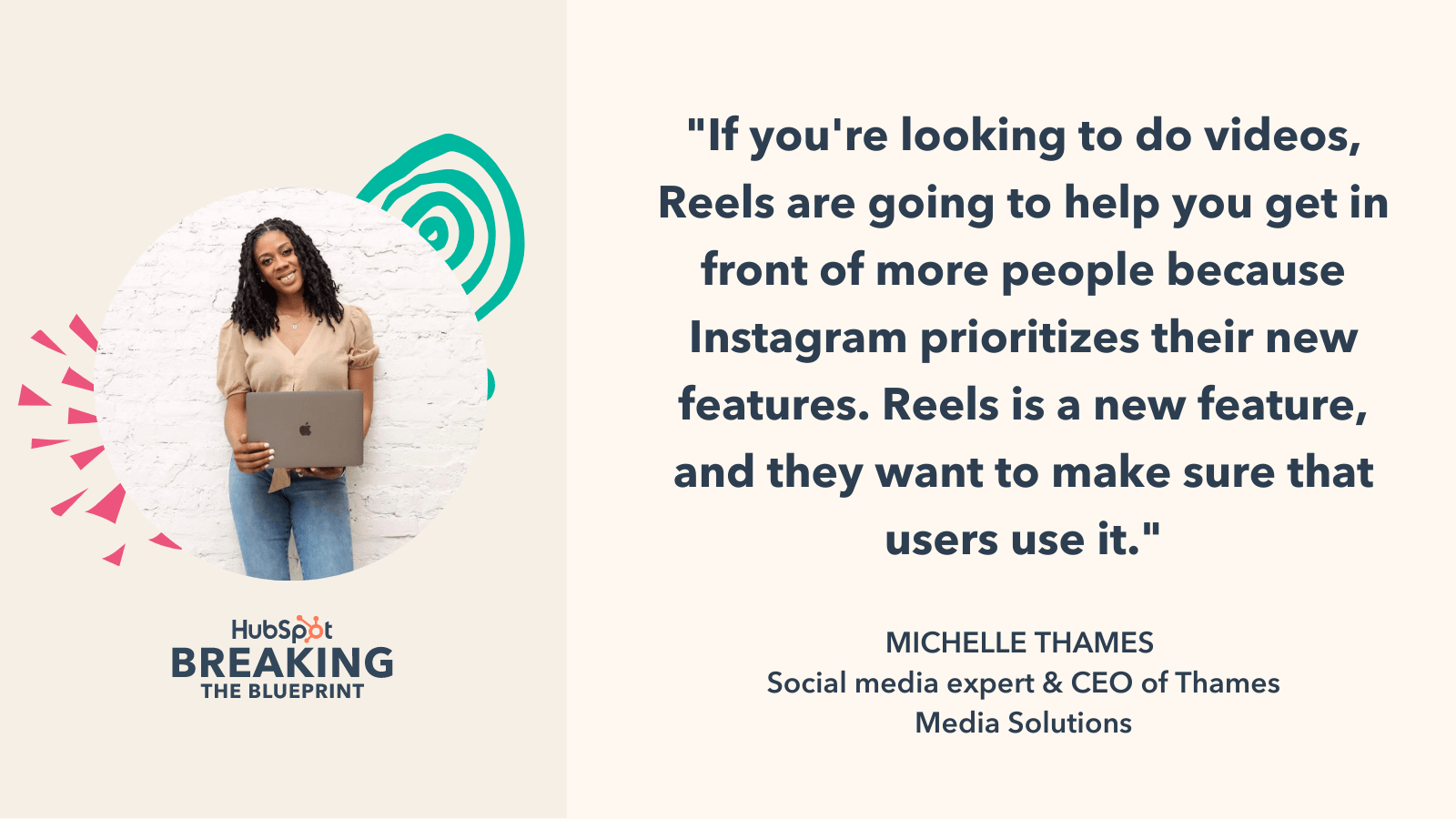
4. Post multiple times a week.
No matter if it’s a photo, Reel, story, or video, business owners should post on their page multiple times a week to not only secure sales, but to stay relevant.
Noelle identifies this strategy as the rapid-fire strategy for social media. She suggests business owners who sell products to post a minimum of once a day, but ideally two to three times a day by creating content using the other aforementioned strategies.
If it is a service-based business, Noelle recommends businesses to post at least three times a week since solopreneurs usually lead this type of company, which can make this effort a daunting task. This strategy can also work for product-based businesses if they’re unable to post multiple times a day.
Mahdi Woodard is a marketing and branding guru who does a great job posting frequently on his page. Woodard posts simple but highly effective content to keep his followers engaged. He uses inspirational quotes and videos to promote his brand.
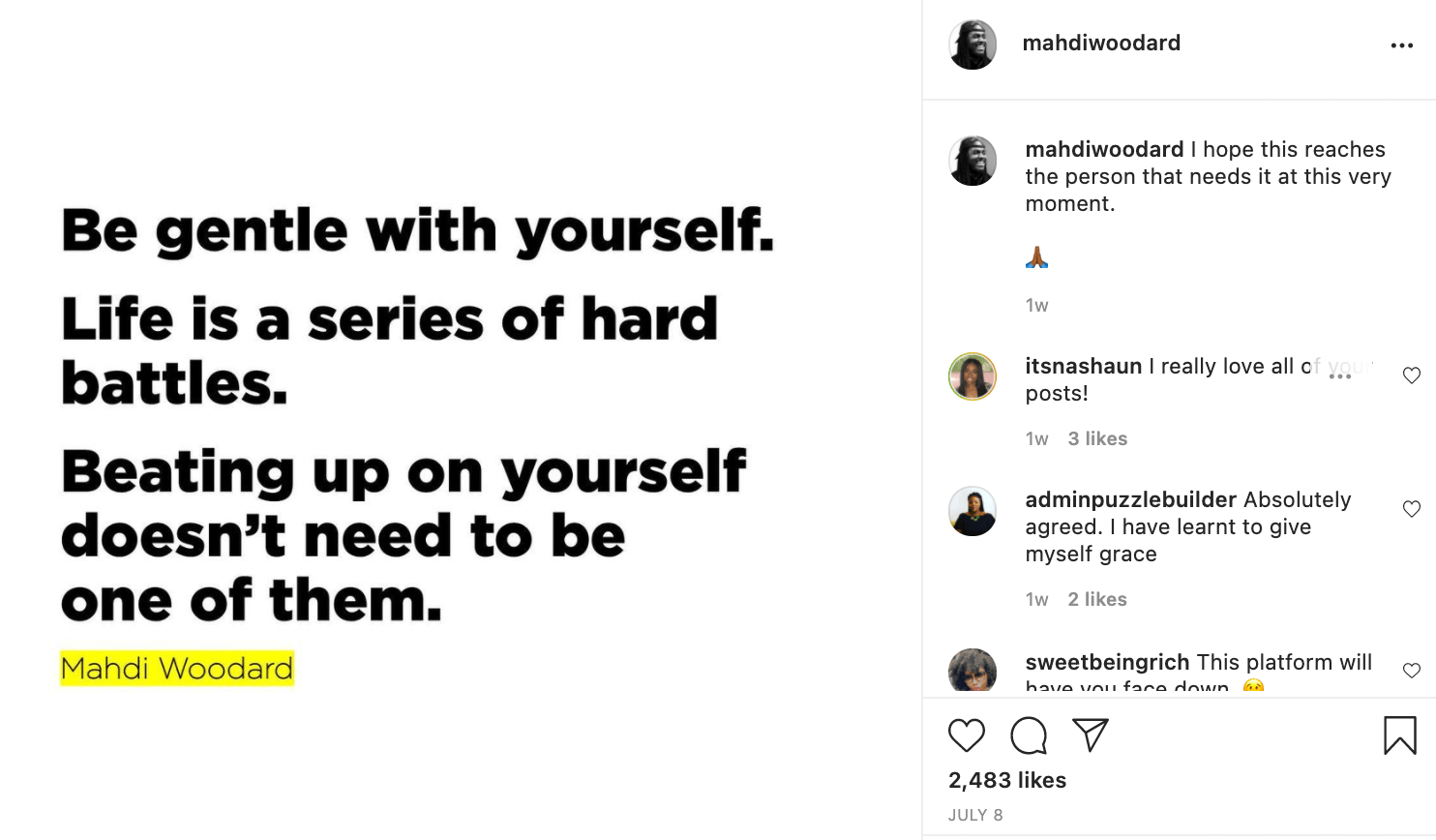
5. Leverage hashtags.
Hashtags are frequently used on platforms such Instagram and TikTok. Entrepreneurs use hashtags to attract potential followers and customers because it’s an easy way to be found, especially when they use niche and location-based hashtags.
Users tend to use hashtags a lot on Instagram and TikTok. Hashtagged words or phrases are one of the best free marketing tools if used correctly.
For instance, I found all three social media experts by using the #socialmediaexperts hashtag on Instagram for this blog post.
6. Use templates.
Bolaji says templates can be a beneficial tool for entrepreneurs because it makes your content layout look clean and consistent. It also makes life easier for business owners because they can use templates to publish their material quickly and efficiently.
Millennial money expert and founder of My Fab Finance, Tonya Rapley, uses templates on her Instagram page. Her page has a consistent color scheme which makes her page look cohesive and appealing.
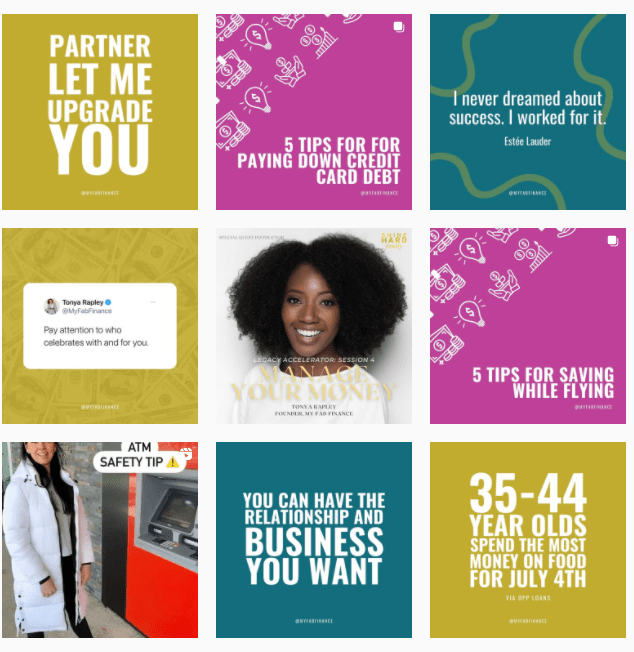 Image Source
Image Source
Every strategy mentioned above is guaranteed to help businesses grow, but Bolaji admits that sometimes business owners can’t use the same approach that got them to 1,000 followers to get 10,000. Even if they’re using all of these strategies, business owners have to stay up-to-speed and learn what method works best for them at various levels of their success.
7 Social Media Tools Black-Owned Businesses Can Use
The strategies listed above are beneficial, but business owners can’t produce quality content for followers if they don’t have the effective tools to make the process easier. Social media tools are essential for business owners to cater to their customers’ needs and provide excellent customer service through proper planning.
Take a look at the tools the social media experts suggested Black-owned businesses use, below.
1. Canva
Canva is a platform used for graphic design. Users can use the tool to create social media graphics, templates, documents, and other visual content.
Price:
Free Version: $0.00
Pro Version: $9.99/month or $119.99/year
Enterprise Version: $30.00/month per person
2. Flodesk
Flodesk is an email marketing service provider that’s built for creators to design and send automated marketing emails to help grow their following.
Price:
$38/month
$418/year
3. Hootsuite
Hootsuite is a social media management platform that has a social network integration feature that gives users the ability to share content onTwitter, Facebook, Instagram, LinkedIn, Pinetrest and YouTube.
Price:
Professional: $49/month
Team: $129/month
Business: $599/month
4. Later
Later is an all-in-one social marketing platform that allows businesses to plan, analyze, and publish content for the top social networks.
Price:
Free Version: $0/month
Starter: $12.50/month
Growth: $20.83/month
Advance: $33.33/month
5. Planoly
Created as the first visual planner for Instagram, Planoly plans, schedules, and measures content across social networks such as Pinterest, Facebook, and Twitter.
Price:
Free Version: $0
Solo: $7 billed annually or $9 month to month
Duo; $15 billed annually or $19 month to month
Custom: $23 billed annually or $29 month to month
6. Pixistock
Pixistock is a Black-owned visual content creation service that offers photos and graphics for websites and social media feeds.
Price:
Member Pricing
- 1-5 photos: $35 each
- 6-9 photos: $30 each
- 10-19 photos: $28 each
- 20-29 photos: $25 each
- 30-49 photos: $20 each
- 50+ photos: $18 each
Non-Member Pricing
- 1-5 photos: $45 each
- 6-9 photos: $40 each
- 10-19 photos: $38 each
- 20-29 photos: $35 each
- 30-49 photos: $30 each
- 50+ photos: $28 each
7. Airtable
Airtable is a low-code, cloud collaborative platform that allows users to build software tools that fit their needs. Users can customize their workflow and collaborate with other creators and creatives.
Price:
Free Version: $0
Plus: $12/month or $10 per seat/month billed annually
Pro: $24/month or $20 per seat/month billed annually
Although it takes commitment and time, social media provides Black entrepreneurs and creatives a space where their voices can be heard. I hope these suggestions will help Black-owned businesses share their talent — whether it be a service or a product — with the world.
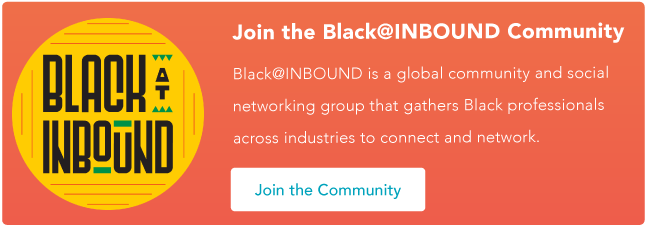
![]()


